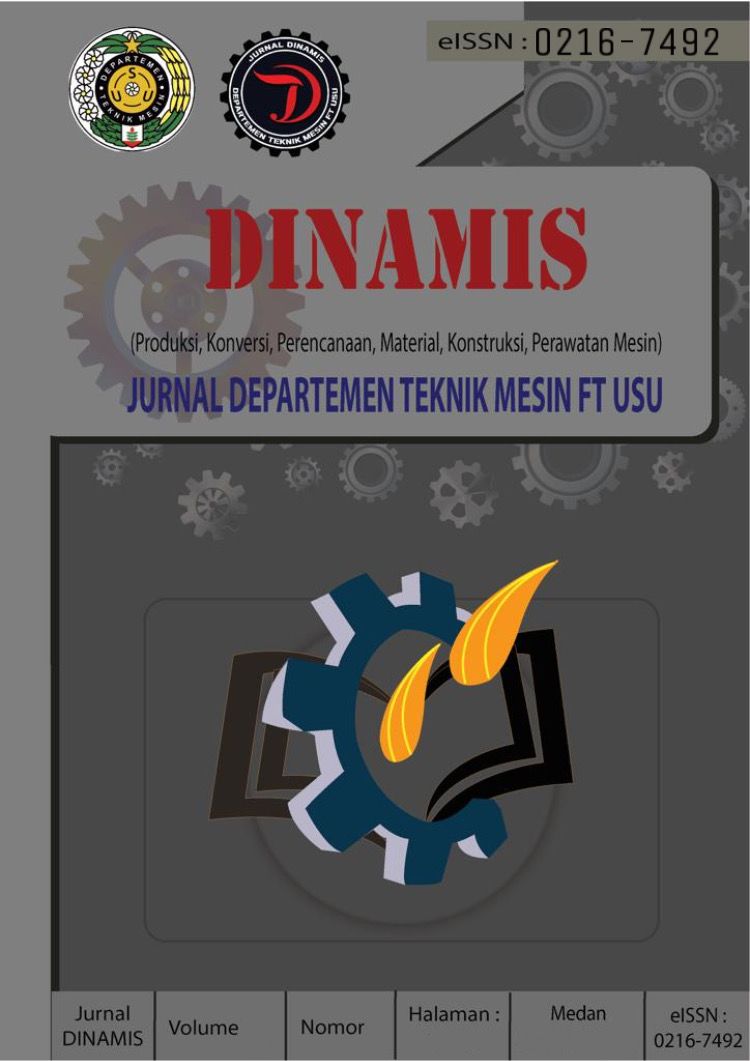EFFECT OF FORGING PROCESS ON IMPACT STRENGTH IN BRASS MATERIALS
DOI:
https://doi.org/10.32734/dinamis.v11i1.12476Abstract
Brass material which generally has low corrosion properties and low frictional forces is very suitable for use as a construction material, piping, ammunition sleeves, jewelry and household appliances. Knowledge of strengthening the mechanical properties of brass materials is needed. In this study, the brass material was forged so that it experienced a volume reduction of 44% at three forging temperatures namely room temperature (28°C), 350°C and 450°C. To observe the impact strength, the brass material specimens were tested using the Charpy Impact tester. The ratio of energy absorbed for forged and unwrought brass specimens was observed using linear regression. The results of physical observations of the fracture pattern show a complete fracture, and the form of a grained fracture. which can be classified as brittle.
Downloads
References
W.D.Callister: Materials Science and Engineering-An Introduction, 5th Edition, John Wiley & Sons,
, 369.
Brady G S 1991 Materials Handbook: an encyclopedia for purchasing managers engineers, executives
and foremen (New York: McGraw-Hill Book Company Inc.)
Abdalla Saif Eldin Mohammed, Analysis of Structural State of 60/40 Brass Cartridge Case (BCC) after
Being Exposed to High Pressure and Temperature of Firing, Journal of Applied Sciences, 2019, 9, 710-
Nabanita Basu, Rachel S. Bolton-King, Geoffrey Stewart Morrison, Forensic comparison of fired
cartridge cases: Feature-extraction methods for feature-based calculation of likelihood ratios, Forensic
Science International: Synergy 5 (2022) 100272.
Song, J. F., et al., “NIST Random Profile Roughness Specimens and Standard Bullets,†Proc. of 2000
Measurement Science Conference (MSC), California, January 2000.
Song, J. F., and Vorburger, T. V., “Development of NIST Standard Bullets and Casings Status Report,â€
NIJ Report 603-00, National Institute of Justice, U.S. Department of Justice, November 2000.
Song, J. F., and Vorburger, T. V., “Proposed Bullet Signature Comparisons using Autocorrelation
Functions,†Proceedings of 2000 NCSL, July 2000, Toronto.
Song, J. F., et al., “Establishment of Measurement Traceability for NIST Standard Bullets and Casings,â€
Proc. 2001 Measurement Science Conference (MSC), Anaheim, CA, January 2001.
M.M.Haque and A.A.Khan, Investigation on Structure and Properties of Brass Casting, J. Mater. Sci.
Technol., Vol.24 No.3, 2008.
Yusrizha Syahid, Rakhmad Arief Siregar, dan M. Yusuf. R. Siahaan "Analisis Karakteristik Mekanik
pada Komposit Kertas Kardus yang Diperkuat dengan Serat Batang Pisang †Agrotekma: Jurnal
Agroteknologi dan Ilmu Pertanian, vol. 6, no. 1, pp. 19-26, 2021.
Darwis Saragih, M. Yusuf. R. Siahaan, dan Rakhmad Arief Siregar "Analisis Kekuatan Mekanik
Material Komposit Berserat Sabut Kelapa yang Berpeluang Diaplikasikan pada Pembuatan Spakbor
Sepeda Motor†Agrotekma: Jurnal Agroteknologi dan Ilmu Pertanian, vol. 6, no. 1, pp. 27-33, 2021.
Wahyu Hidayat, “Analisis Pengaruh Penambahan Unsur Nikel (Ni) Terhadap Sifat Mekanik, Struktur
Mikro dan Ketahanan Korosi Paduan Tembaga Nikel (Cu-Ni) sebagai Material Alternatif Untuk
Pengecoran Ball Valveâ€, Repositori Institut Teknologi Sepuluh Nopember, Kota Surabaya, 2017.
Felyx B. Sihombing, M. Yusuf. R. Siahaan, dan Rakhmad Arief Siregar "Analisis Kekuatan Mekanik
Material Komposit yang Berpeluang Diaplikasikan pada Handle Rem Sepeda Motor", JMEMME
(Journal of Mechanical Enggineering, Manufactures, Materials and Energy), vol. 6, no. 1, pp. 86-93,
Muliya Selamet, “Analisis Sifat Mekanik dan Struktur Mikro Alumunium Seri 6061 Hasil Proses
Pengecoran dengan Variasi Penambahan Tembaga (Cu)â€, Repositori Universitas Negeri Malang, Kota
Malang, 2022.
M. Yusuf. R. Siahaan, Rakhmad A. Siregar, Faisal A. Tanjung, dan Agung Saktiawan “Analisis
Karakteristik Bahan Tembaga Akibat Pengaruh Proses Penempaan Terhadap Kekuatan Impakâ€, Jurnal
RMME, vol 6, no. 1, pp. 99-105, 2023.
Hosford, William F, Caddel, Robert M, Metal Forming Mechanics and Metallurgy, Third Edition,
Cambridge – Inggris : Cambridge University Press.
Additional Files
Published
How to Cite
Issue
Section
License
Copyright (c) 2023 Dinamis : Scientific Journal Mechanical Engineering

This work is licensed under a Creative Commons Attribution-ShareAlike 4.0 International License.






